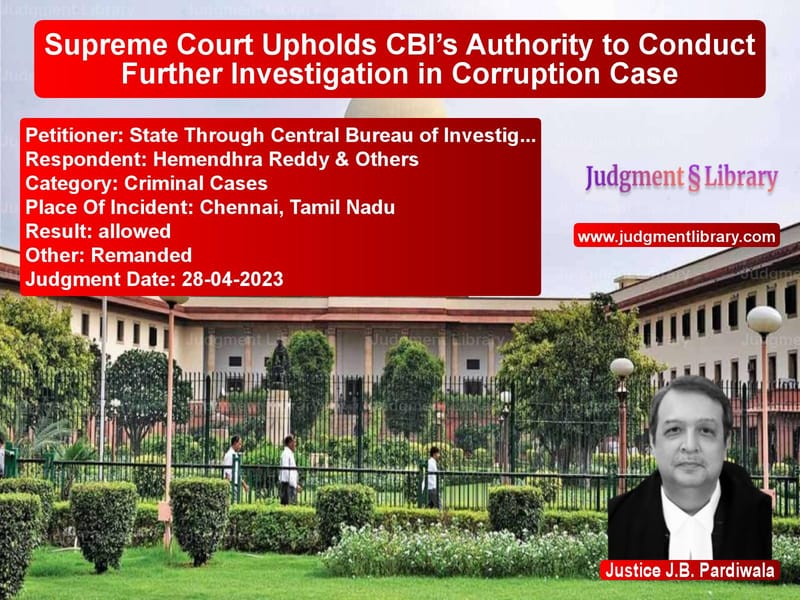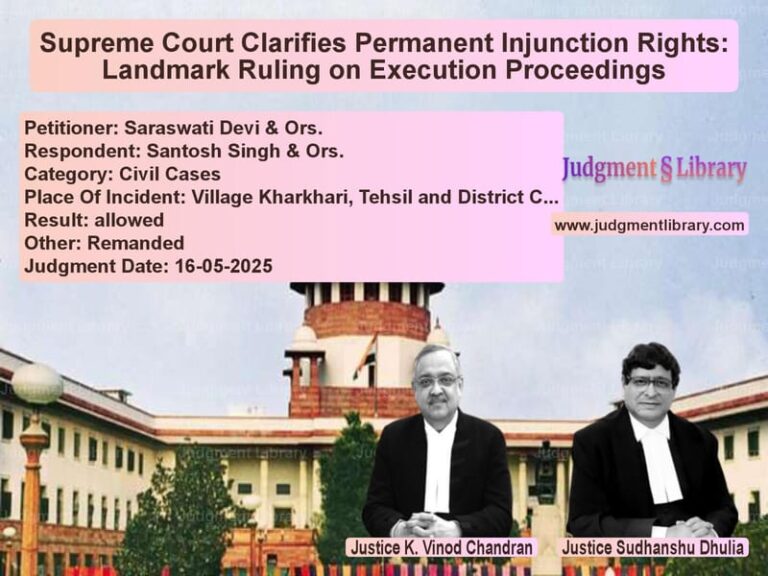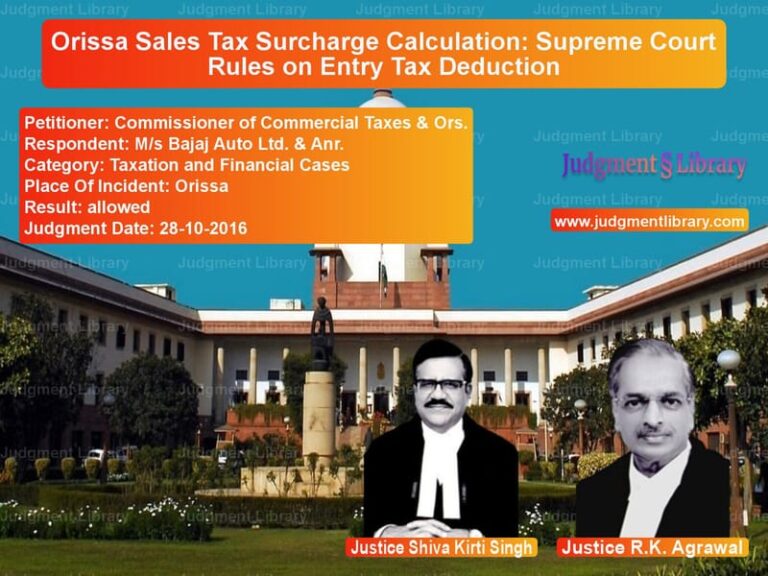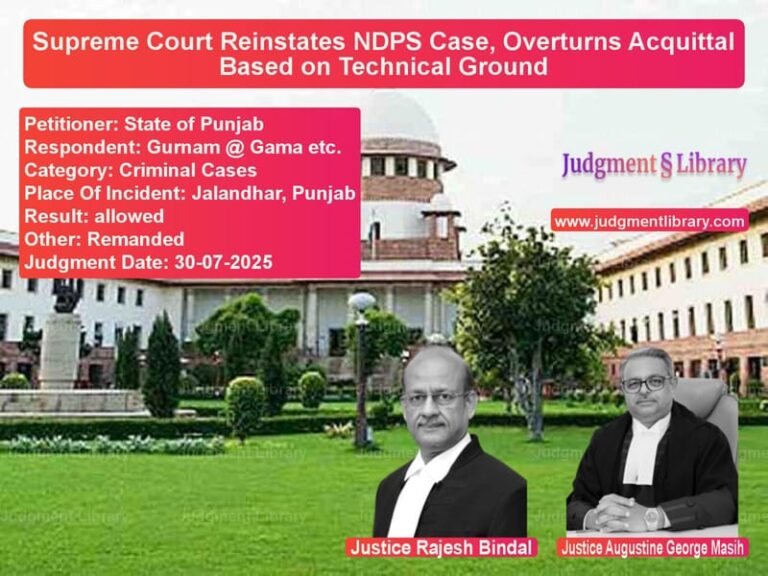Supreme Court Upholds CBI’s Authority to Conduct Further Investigation in Corruption Case
The case of State Through Central Bureau of Investigation vs. Hemendhra Reddy & Others is a landmark decision that clarifies the legal position on the Central Bureau of Investigation’s (CBI) power to conduct further investigation under Section 173(8) of the Code of Criminal Procedure (CrPC), even after a closure report has been accepted by a court. The Supreme Court ruled in favor of the CBI, allowing it to proceed with further investigation in a disproportionate assets case involving a Customs officer.
Background of the Case
The case involved D. Dwarakanadha Reddy (Accused No. 1), a Customs Department officer, who was alleged to have acquired disproportionate assets beyond his known sources of income. His wife, D. Sujana Reddy (Accused No. 2), and his brother-in-law, Hemendra Reddy (Accused No. 3), were also implicated in the case.
The CBI initially investigated the matter and filed a closure report under Section 173(2) of the CrPC in 2008, stating that the accused could not be prosecuted. This closure report was accepted by the Special Court for CBI Cases, Chennai. However, in 2013, the CBI obtained new evidence indicating that the accused possessed disproportionate assets, prompting the agency to seek permission to reopen and conduct further investigation under Section 173(8) of the CrPC.
Legal Issues Before the Court
- Whether the CBI had the authority to conduct further investigation under Section 173(8) of the CrPC after submitting and obtaining acceptance of a closure report.
- Whether the High Court was justified in quashing the CBI’s further investigation and the subsequent chargesheet.
- Whether the accused’s right to a speedy trial under Article 21 of the Constitution was violated by the reopening of the case.
Arguments by the Petitioner (CBI)
The CBI, represented by the Additional Solicitor General, argued:
- “The High Court committed a serious error in quashing the CBI’s further investigation, leading to a miscarriage of justice.”
- “New material evidence surfaced in 2013, justifying the need for further investigation.”
- “The Special Court properly allowed further investigation, and the High Court could not override that decision.”
- “The principle of finality in criminal proceedings does not apply to further investigation under Section 173(8) of the CrPC.”
Arguments by the Respondents (Accused Persons)
The accused, represented by their legal counsel, countered:
- “Once the closure report was accepted, the CBI had no authority to reopen the investigation.”
- “The delay of four years in reopening the case violated their right to a speedy trial under Article 21 of the Constitution.”
- “The CBI’s request for further investigation was essentially a reinvestigation, which is not permitted under the law.”
- “The Special Court erred in granting permission for further investigation without hearing the accused.”
Supreme Court’s Analysis and Judgment
The Supreme Court ruled in favor of the CBI, stating that:
- “The acceptance of a closure report does not bar further investigation under Section 173(8) of the CrPC.”
- “The purpose of further investigation is to ensure that the truth is uncovered and justice is served.”
- “A Special Court has the authority to permit further investigation if new evidence emerges, even after a closure report is accepted.”
- “The accused’s right to a speedy trial cannot be used as a shield to prevent further investigation when new facts come to light.”
The Court further observed:
“There is no statutory bar on further investigation merely because a final report has been submitted and accepted. The purpose of criminal investigation is to arrive at the truth, and Section 173(8) enables the investigating agency to continue gathering evidence if fresh material surfaces.”
Key Takeaways from the Judgment
- Further investigation under Section 173(8) of the CrPC is permissible even after a closure report is accepted.
- A Special Court has the authority to permit further investigation if new evidence emerges.
- Reinvestigation or de novo investigation is not permitted, but further investigation is a continuation of the original investigation.
- The right to a speedy trial cannot override the need for justice and truth.
Impact of the Judgment
This ruling has significant implications for criminal investigations in India, particularly in cases involving corruption and disproportionate assets. The judgment reaffirms the power of investigative agencies to conduct further investigations when new evidence surfaces, ensuring that accused individuals cannot escape prosecution merely because an earlier investigation was inconclusive.
By ruling in favor of the CBI, the Supreme Court has reinforced the principle that criminal investigations must prioritize uncovering the truth over procedural technicalities. This decision strengthens anti-corruption efforts and ensures that investigating agencies are not unduly restrained by procedural barriers when new evidence emerges.
Petitioner Name: State Through Central Bureau of Investigation.Respondent Name: Hemendhra Reddy & Others.Judgment By: Justice J.B. Pardiwala.Place Of Incident: Chennai, Tamil Nadu.Judgment Date: 28-04-2023.
Don’t miss out on the full details! Download the complete judgment in PDF format below and gain valuable insights instantly!
Download Judgment: state-through-centra-vs-hemendhra-reddy-&-ot-supreme-court-of-india-judgment-dated-28-04-2023.pdf
Directly Download Judgment: Directly download this Judgment
See all petitions in Fraud and Forgery
See all petitions in Money Laundering Cases
See all petitions in Bail and Anticipatory Bail
See all petitions in Custodial Deaths and Police Misconduct
See all petitions in Extortion and Blackmail
See all petitions in Judgment by J.B. Pardiwala
See all petitions in allowed
See all petitions in Remanded
See all petitions in supreme court of India judgments April 2023
See all petitions in 2023 judgments
See all posts in Criminal Cases Category
See all allowed petitions in Criminal Cases Category
See all Dismissed petitions in Criminal Cases Category
See all partially allowed petitions in Criminal Cases Category







